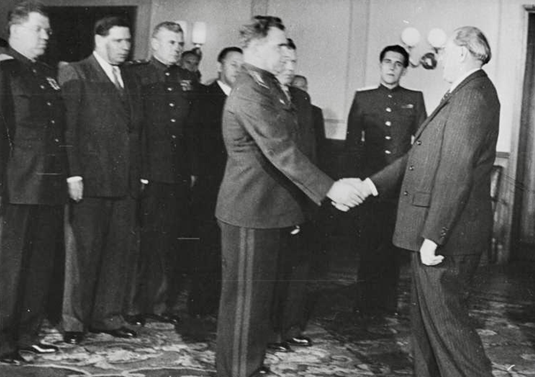Not One Step Back!
- Maria A. Kithcart

- Jan 7, 2022
- 3 min read

Pictured: A copy of Order #227, ‘Not One Step Back,’ which was decreed by Stalin on 28 July 1942. The message was read to units of soldiers on the Bryansk Front, dated 29 July 1942. This document belonged to the Deputy Chief of the Hospital GLR-1951 for Political Affairs, Battalion Commissar Major L. S. Keller.
When consistently conducting research on a historical figure, one sometimes discovers misinformation and mythology attributed to the person. Unfortunately, such misrepresentation can be perpetuated through the acceptance of such information at face value only. A researcher must be intuitive and doggedly pursue the truth, digging to find a more complete, accurate picture. While I am not a true historian per se, I have been a student of leadership at the post-baccalaureate level since 2008 when I first began my journey into the social sciences. Doctoral studies in leadership theories, practices, and research have been a part of my life since 2010.
Now to address the misinformation… Antony Beevor, a well-known British historian and writer, penned the work Stalingrad: The Fateful Siege. While much of his writing is accurate, his statements indicating that Chuikov himself was responsible for 13,000 soldier deaths for cowardice relating to the infamous Order #227 ‘Not One Step Back’ are challenged. This distortion found its way into documentaries such as BBC’s “War of the Century,” which I have viewed critically numerous times as part of my research. Such misrepresentation paints the picture of Chuikov as a harsh, draconian, ruthless tyrant lacking empathy or remorse regarding the ordinary soldier. Yes, there were executions due to cowardice at the front—Lieutenant-General Chuikov admitted to such. However, Soviet documents in Russian archives indicate fewer than 300 executions by the NKVD in Stalingrad during the worst part of the battle, from July to mid-October 1942. And one must recall there were multiple armies in the Stalingrad Front. Authors Michael Jones and Jochen Hellbeck debunk Beevor’s claims in their respective works, which are the sources referenced in my blog posts due to their accuracy.
Regarding Order #227, Vasily Ivanovich realized that he was also strictly bound by this same order—what applied to the ordinary soldier also applied to officers. In his work titled From Stalingrad to Berlin, Marshal Chuikov shared his thoughts and experiences related to Order #227:
“Calls ‘Not a step back!’ were distributed earlier. But never before the entire staff, both the command and the private, has not a single document disclosed with such complete frankness the position of our country. This order was essentially an appeal to the entire Soviet people, for the Red Army was the people's army, flesh and blood of the entire multinational Soviet people. The party, the Soviet government openly shared their difficulties with the people, this could not fail to find the most ardent response and could not fail to produce results. Every soldier, every commander was imbued with responsibility before the Motherland, before the people. Indeed, there was nowhere else to retreat. This document was a whole stage in political work. Political workers were given the opportunity to frankly, without embellishing reality, explain the situation to ordinary soldiers and demanded to follow orders exactly. Commanders of all levels realized that retreat was no longer a panacea for all evils.
But it would be naive to believe that this order alone brought a turning point in the psychology of the soldiers. [The order] kind of expressed the mood that has ripened in everyone since the beginning of the summer campaign. The order itself, without the awareness of hundreds of thousands of people of the tragic situation in which we all found ourselves, would not have done anything. Pain, vexation, bitterness - this is what our soldier was born within the days of a difficult retreat. The Red Army men and junior commanders told me: ‘We retreated last year... Well, that was understandable... Sudden blow, we lost a lot of aircraft and tanks even before we entered the battle. Now we have tanks and planes, we have weapons... Now we can stop the enemy! Why, why are we retreating?!’”



